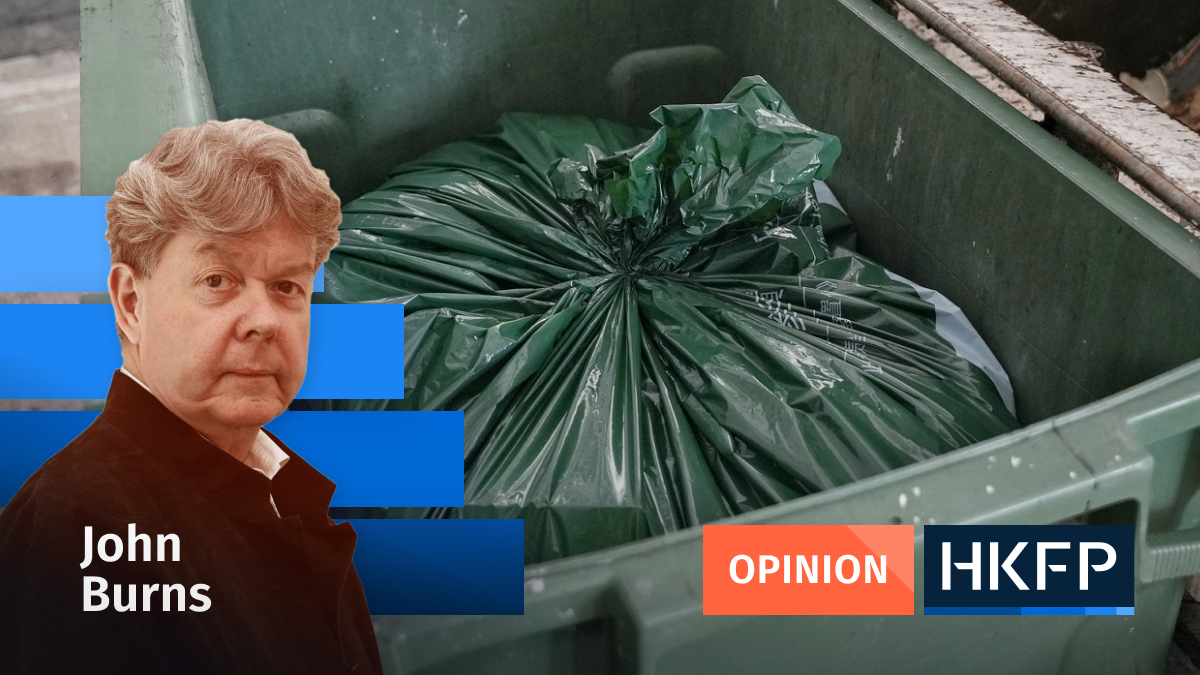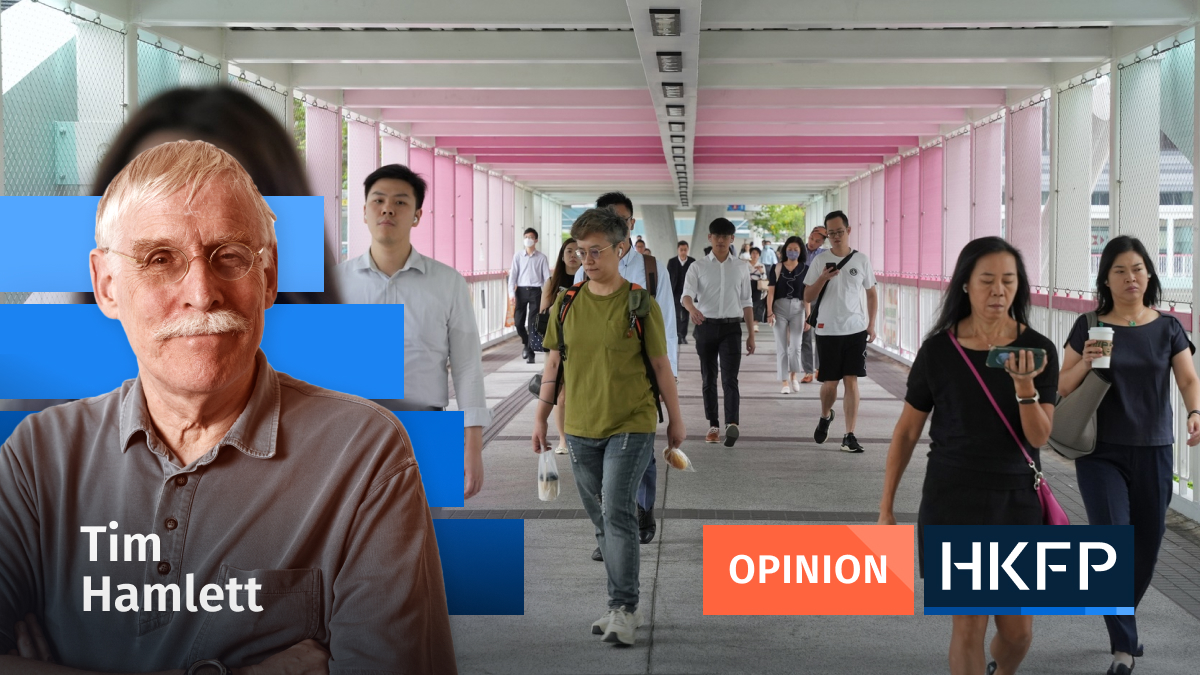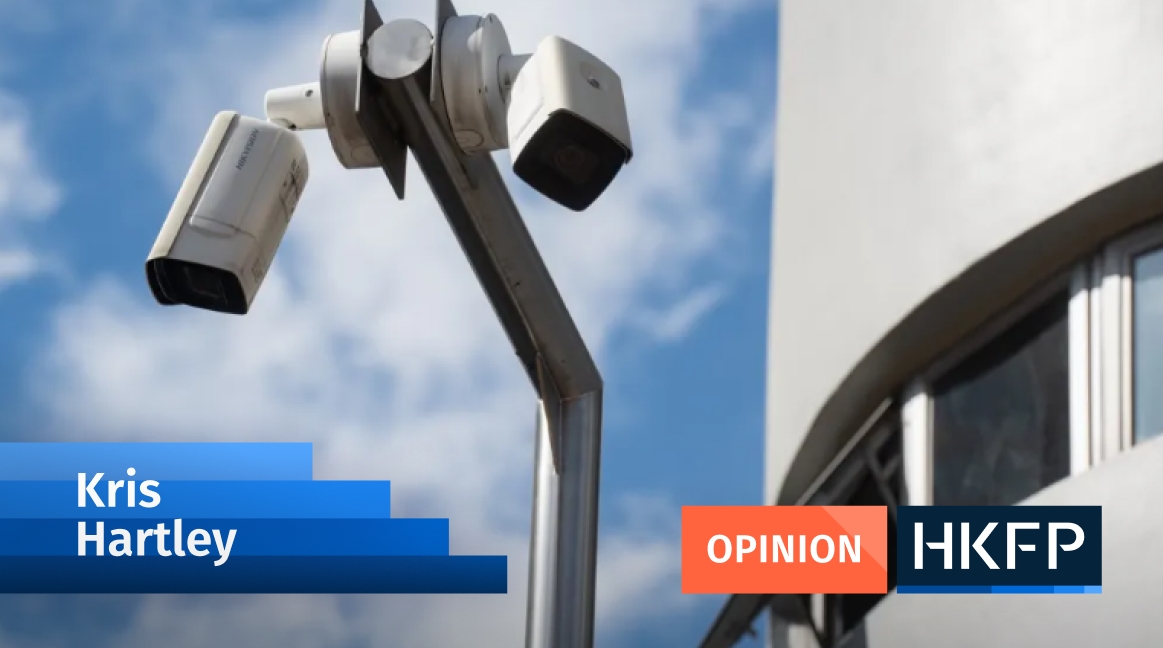Congratulations to the production managers in Beijing and the campaign managers here. Together they have designed and orchestrated a new-style election system for Hong Kong that has succeeded in producing exactly the results they intended.

Unlike the old legislature, this new one can safely contribute to the “administration” of Hong Kong without disrupting its “executive-led” local government or the sovereign party-led authority in Beijing. A rectification of names has been achieved and the institutions can now perform as intended — or so we are being led to believe.
As a result of the election held on December 19, Hong Kong now has a legislature guaranteed to be dissident-free. Yet every seat in two of its three constituencies was contested and every directly elected seat had at least one “non-pro-government” candidate on the ballot. This was a tribute to the diligent efforts of the campaign managers working out of Beijing’s representative Liaison Office here.
The 10 new Geographic Constituencies thus provided all registered voters with an opportunity to choose, and the managers seemed to have bent some of their strict vetting rules about political eligibility in order to fulfil their claim about a place where all legitimate candidates can have a chance.
The new constituency boundaries had nevertheless been carefully drawn by the production managers to gain maximum advantage from pro-government residential and voting patterns on Hong Kong Island and in central Kowloon, as well as in the suburban New Territories.
As a result, only one “non-pro-establishment” voice will be heard in Hong Kong’s newly elected Legislative Council. It is the voice of ex-Democratic Party member Tik Chi-yuen who won a Functional Constituency (Social Welfare) seat. His response: better one voice than none.

Hong Kong’s new 90-seat legislature is still known by its old colonial name as the Legislative Council (LegCo). Its seats are divided among various constituencies that are called broadly representative but are in fact skilfully designed to balance always in the government’s favour.
Actually, the constituencies are now more representative than ever before — representing more sectors with cross-border professional interests and political loyalties. Others do not qualify for representation, which in years past amounted to a majority of the voting public.
The divisions are: 20 seats directly elected from 10 Geographic Constituencies; 30 seats representing occupation-based Functional Constituencies; and 40 seats filled by a 1,448 Election Committee, which is also the creation of the Functional Constituency electorates.
It was an impressive performance, but a costly one. To achieve it, the production managers had to redesign the existing system established when Hong Kong returned to Chinese rule in 1997. Beijing also had to renege on the promises made then that allowed Hong Kong’s democracy movement to grow strong enough, by 2019, to demand that the promises be fulfilled.
The old 1997-2021 Legislative Council had 70 seats. Half were directly elected; the other half were indirectly elected by the Functional Constituencies. Five of these latter were in transition to universal suffrage, in accordance with the promises of 1997.
Those promises included the eventual election of both Hong Kong’s Chief Executive and the entire Legislative Council by one-person, one-vote universal suffrage. The promises were among those written into Hong Kong’s Basic Law constitution promulgated by Beijing in 1990, for post-1997 use.
Pre-election atmospherics
Further on the consequences of those broken promises, and as the first order of business, all the democracy movement’s leading candidates had to be removed from the competition. This took the better part of a year, following the promulgation of a National Security Law for Hong Kong by the central government on June 30, 2020. Consequently, this election, originally scheduled for September 2020, was delayed by a year.
As a result of the new political standards introduced by the new law, all the leading pro-democracy candidates — who had already begun preparing to contest this election — are either in jail facing a range of charges deriving from the new law; or have been disqualified on the basis of the stringent new national security standards also deriving from the new law; or have fled to safety overseas.
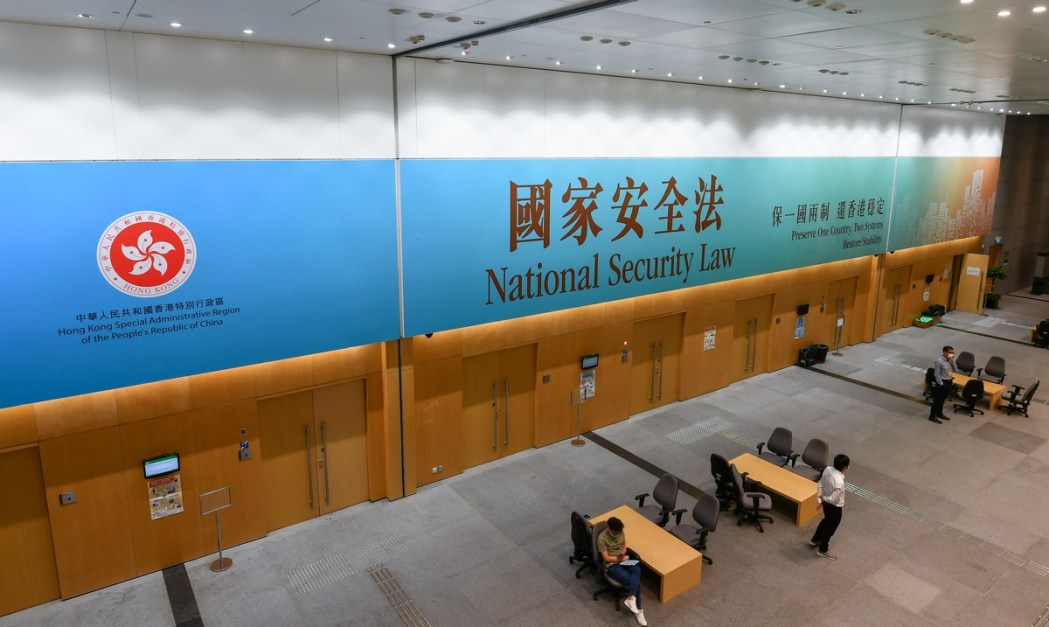
The chief measure of eligibility is full acceptance of Beijing’s rules for Hong Kong’s political life that are far different from those promised in 1997, or at least what was commonly understood to have been promised by Beijing at that time and allowed to stand for two decades thereafter.
Beijing has given the designation “patriots” to such people and now insists that only patriots will be allowed to administer Hong Kong. Hence this was not an election for everybody but for “patriots only.” Others are not represented.
After strict political vetting, only about a dozen candidates were designated as “non-pro-establishment” or “centrist” — because no one knew what else to call them. They included, besides a few non-partisans, mostly breakaway pro-democracy moderates who found themselves increasingly at odds with the determined activism of the movement as a whole in recent years.
As a further result of these dramatic political changes, calls to boycott the election or cast blank ballots emerged by way of protest. These sentiments could not be expressed locally without cost. As soon as they began to circulate, a new amendment was added to the local election ordinance, in April, criminalising such calls. Violations of the newly amended Election (Corrupt and Illegal Conduct) Ordinance could lead to a maximum penalty of three years prison time and a fine of HK$200,000.
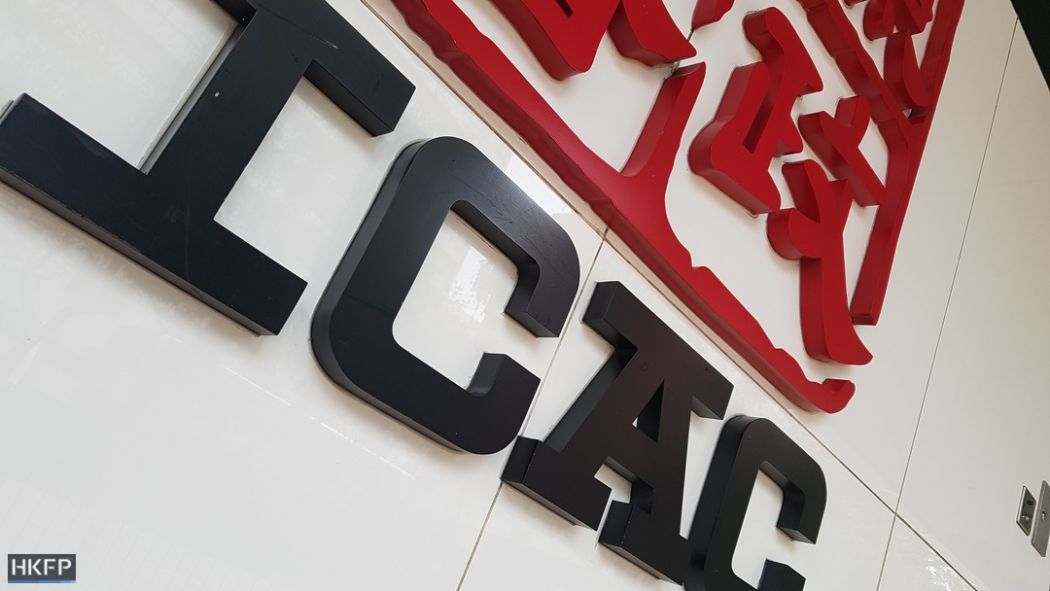
All this gave rise to rumours that even the act of casting a blank ballot — not just advocating the act — would be illegal, but this was eventually denied. Only a rumour, not the law, said the head of the Independent Commission Against Corruption (ICAC).
But he failed to note that the new unfolded flat paper-ballot design — and the narrow ballot box opening — make it difficult to cast a blank ballot in secret, given the number of poll workers standing close by to keep watch on the boxes. And who knows what charges might eventually be levelled against those who voted so maliciously or failed to vote at all?
Meanwhile, the ICAC is, trying to decide whether the Public Opinion Research Institute (PORI) broke any laws by asking people whether they planned to vote and then publishing the results of their replies. The charge might be incitement.
Just a week before the election, Chief Secretary John Lee warned that foreign agents, still lurking about in Hong Kong, were intent on disrupting the vote. He referred variously to covert foreign agents, destructive forces, and anti-China disrupters. He is among the Hong Kong officials who have taken easily to mainland-style political rhetoric. There are actually not many.
Speaking via video link on December 10, prominent Hong Kong activist Nathan Law referred to Hong Kong as a “police state.” Law is now in self-imposed exile overseas and was addressing US President Joe Biden’s Summit on Democracy.
Officials here and in Beijing professed outrage. The mainland media went into overdrive, declaring that Law would be “crucified on the pillar of historical shame” for even speaking at such an event. But overseas observers could hardly be blamed for drawing their own conclusions when official scaremongering here has been taken to such extremes.
Invoking the extraterritorial provisions of the new National Security Law, police promptly issued arrest warrants for Nathan Law and four others. The charge: violating the newly amended ordinance that criminalises calling for election boycotts and blank ballot protests.
Officials feared politically motivated violence, referred to by the new national security designation as “terrorism.” Hence uniformed police officers were on the alert to guard against “lone wolf” attacks. The seizure of a weapons cache and arrest of 10 suspects was front-page news on December 15. Police said members of a secret violent organisation may have been planning to disrupt the poll.
Election day
Yet despite the extraordinary circumstances, it seemed like any ordinary Election Day. The polls opened on schedule at 8:30 a.m. on Sunday, December 19, and closed at 10:30 p.m. Ballots were sent to the central counting station at Hong Kong’s Convention and Exhibition Centre in Wanchai. Results were announced the next day. All was calm, quiet, peaceful.

Some key numbers included about 4.5 million registered voters and 630 polling stations with close to 40,000 people on hand to conduct the proceedings, including 10,000 police officers, Civil Aid Service workers, and civil servants seconded from their regular work. They were tasked with overseeing, conducting, and guarding the proceedings throughout the day.
Everyone had reportedly undergone strict political vetting to ensure absolute political loyalty, as well as training in the skills needed to keep everything moving along smoothly. But throughout the day, there often seemed to be more attendants on hand than voters. The turnout rate was only 30.2 percent of all registered voters, the lowest since 1997.
Some speculated that the low turnout was due to democrats’ boycott of the mainland-style managed election. But since discussing the issue had become a possible criminal offence, depending on the circumstances of the conversation, most everyone refrained. One lawyer’s advice: better not to discuss what is happening until after it has happened! Perhaps PORI will be brave enough to pursue its survey research on this question at some later date.

Public transport fares were waived for the day as part of the government’s get-out-the-vote drive, and many took advantage of the rare opportunity to travel for free. But as for voting, the concession wasn’t necessary since most polling stations are within walking distance of people’s homes. Given the low turnout, many Hongkongers seem to have enjoyed the fare-holiday and to have left voting for another time.
Results
The new LegCo has 90 members: Election Committee, 40; Functional Constituencies, 30; Geographic Constituencies, 20.
Validly nominated candidates numbered 153 in all, or 51 candidates for 40 Election Committee seats, 67 candidates for 30 Functional Committee seats; and 35 candidates for 20 seats — filled by one-person, one-vote — in the 10 Geographic Constituencies.
Patriots naturally swept the field, winning all but the one seat. Functional Constituency (Social Welfare) went to Tik Chi-yuen. None of the other “centrist” non-pro-establishment candidates prevailed.
The two main pro-Beijing loyalist organisations won a total of 27 seats: 19 for the Democratic Alliance for the Betterment and Progress of Hong Kong (DAB) political party, and eight for the Federation of Trade Unions (FTU).
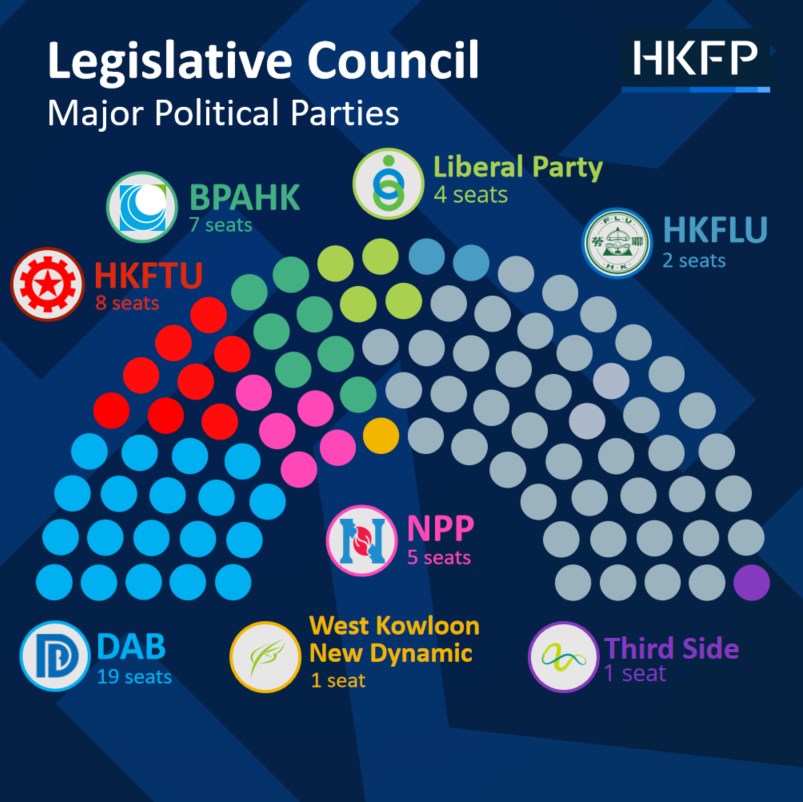
They are not enough to form a majority in the 90-seat chamber, but enough to dominate its work with the help of the Business and Professionals Alliance (seven seats); Regina Ip’s New People’s Party (five seats); and the traditional pro-business Liberal Party (four seats).
Beijing’s Liaison Office personnel will no doubt continue in their “managerial” advisory roles, in order to ensure that these lawmakers all stay on the same page. In a TV interview aired on December 21, veteran pro-establishment loyalist Rita Fan assured viewers that there are differences among such legislators. She speaks from experience, since she served for many years as a legislator and Legislative Council president.
But besides creating a winning coalition of officially safe and politically correct legislators, the December 19 election also signalled defeat for the centrist cause. Pro-democracy moderates Ronny Tong, Tik chi-yuen, and Nelson Wong all idealised their roles as a force for moderation between the two antagonistic pro-democracy and pro-Beijing camps. Yet the most they have been able to deliver are talking points, since Hong Kong’s political arena seems to have no space for the moderate middle way. The fate of centrist candidates in the 10 Geographic Constituencies suggest their bleak political prospects. Full official election results are available online.

In Hong Kong Island East, with its large concentration of pro-Beijing voters, engineer Jason Poon was the man with the most audacious manifesto. He advocated amnesty for all political prisoners and special elections to allow all the now disqualified District Councillors from the 2019 landslide election to regain their seats. He received only 14,000 votes. His FTU and DAB competitors won with 64,500 votes and 26,800 votes, respectively.
He thanked those who voted for him, and those who did not, saying the latter were signalling their disapproval of the flawed election system by staying away from the polls.
In Hong Kong Island West that now merges Hong Kong Island with part of a previous conservative New Territories constituency, Regina Ip won a seat, receiving over 65,000 votes. The FTU candidate also won, but independent democrat Fong Lung-fei received only 8,000 votes.
In Kowloon West, veteran campaigner Frederick Fung, despite his new “youthful” hairstyle, lost his bid for a comeback, receiving only 15,961 votes. His victorious competitors won 64,000 and 36,800, respectively.
In Kowloon Central, it was wrong to think Mandy Tam might win. She received only 8,000 votes, whereas DAB Chairwoman Starry Lee emerged as the “Queen of Votes” territory-wide, with 96,000. The other candidate in the constituency, Yang Wing-kit, may have been a non-partisan contender without an all-city reputation. But he is well-known in the district and received 35,700 votes.
Jeffrey Chan from Ronny Tong’s Path of Democracy contested a seat in Kowloon East. He earned the distinction of coming in last among the Geographic Constituency contenders, receiving only 3,000 votes.
In New Territories Southeast, ex-Civic Party member Daryl Choi came in last with only 6,700 votes. In New Territories North, Judy Tzeng may have been running as a non-partisan, but her manifesto suggested she is an unreconstructed democrat. The managers, knowing she could not win in so conservative a district, probably approved her candidacy as window dressing to support their “all voices represented” claim. She lost, receiving only 3,500 votes.
In New Territories Northwest, centrist Casper Wong lost out to the DAB’s Holden Chow and pro-establishment veteran Michael Tien. Wong’s vote count was 4,066; Holden Chow’s 93,000.
In New Territories Southwest, Adrian Lau lost out to DAB and FTU candidates. And in New Territories Northeast, the two centrist candidates combined won only 10,000 votes whereas the two winners each received over 60,000.
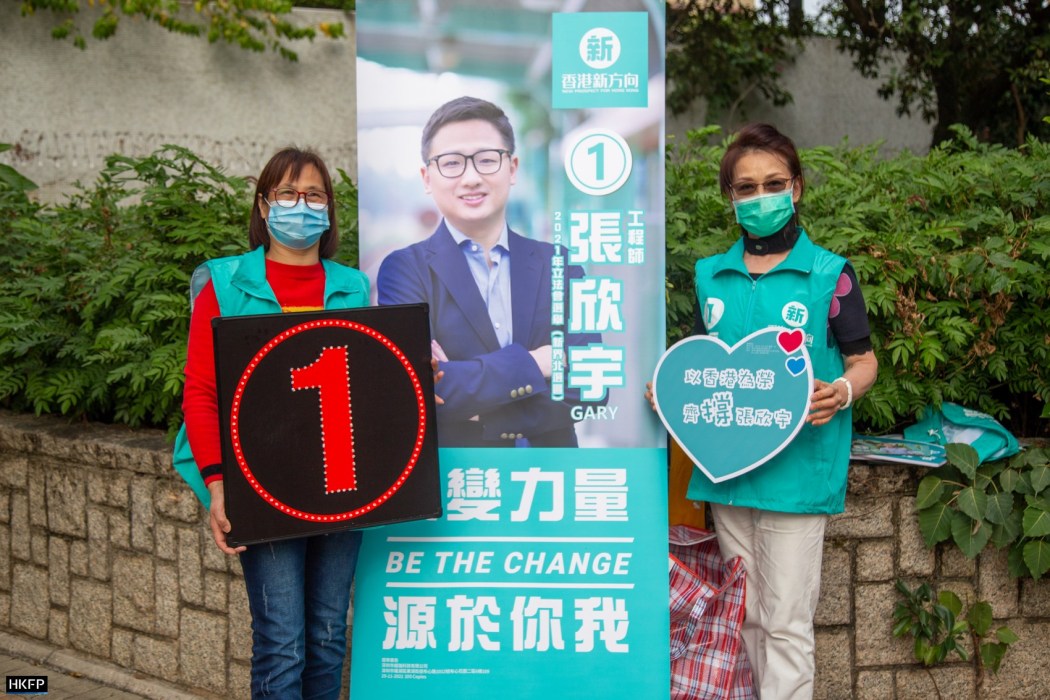
Gary Zhang, famous as the man in charge at the Prince Edward Mass Transit Railway Station on the night of August 31, 2019, won a seat in New Territories North with 29,000 votes. Fellow candidate Lau Kwok-fan (DAB) was nevertheless far ahead with 70,000.
Zhang’s New Prospect Party represents new mainland migrants. Whether he really is a cross-over candidate capable of bridging the mainlander-Hongkonger divide, as his statements have suggested, remains to be seen.
As for the new Liaison Office campaign managers, they are obviously familiar with the terrain throughout Hong Kong and, reportedly, positioned the candidates carefully in order to gain maximum advantage from each of the newly drawn voting districts.
Prisoners voting
Following a reform measure promoted by pro-democracy legislators over a decade ago, Hong Kong prisoners are now allowed to vote.
But no one did. Casting blank ballots in secret would no doubt be even more problematic for them than for ordinary voters. Probably no one among Hong Kong’s new cast of political prisoners would want to vote anyway, given the circumstances.

Among the prisoners who have fallen afoul of the new National Security Law standards are 32 who were associated with the “illegal” informal candidate selection exercise they organised in July 2020. Its purpose was to winnow the field of candidates for this LegCo election, which at the time was scheduled for September 2020.
Their informal “primary election” exercise is now allegedly a national security crime, for aiming to “overthrow” the Hong Kong government by winning a majority in the Legislative Council.
Several involved in the primary elections case have been granted bail but under the strict new National Security rules, 32 remain in prison where they have been for almost a year and must remain until they go to trial. If found guilty, they will be spending many more years behind bars as well … A sad commentary on the high hopes last year for a democratic majority in LegCo.
Support HKFP | Policies & Ethics | Error/typo? | Contact Us | Newsletter | Transparency & Annual Report | Apps
| HKFP is an impartial platform & does not necessarily share the views of opinion writers or advertisers. HKFP presents a diversity of views & regularly invites figures across the political spectrum to write for us. Press freedom is guaranteed under the Basic Law, security law, Bill of Rights and Chinese constitution. Opinion pieces aim to point out errors or defects in the government, law or policies, or aim to suggest ideas or alterations via legal means without an intention of hatred, discontent or hostility against the authorities or other communities. |
Help safeguard press freedom & keep HKFP free for all readers by supporting our team

More HKFP OPINION:
HKFP has an impartial stance, transparent funding, and balanced coverage guided by an Ethics Code and Corrections Policy.
Support press freedom & help us surpass 1,000 monthly Patrons: 100% independent, governed by an ethics code & not-for-profit.




